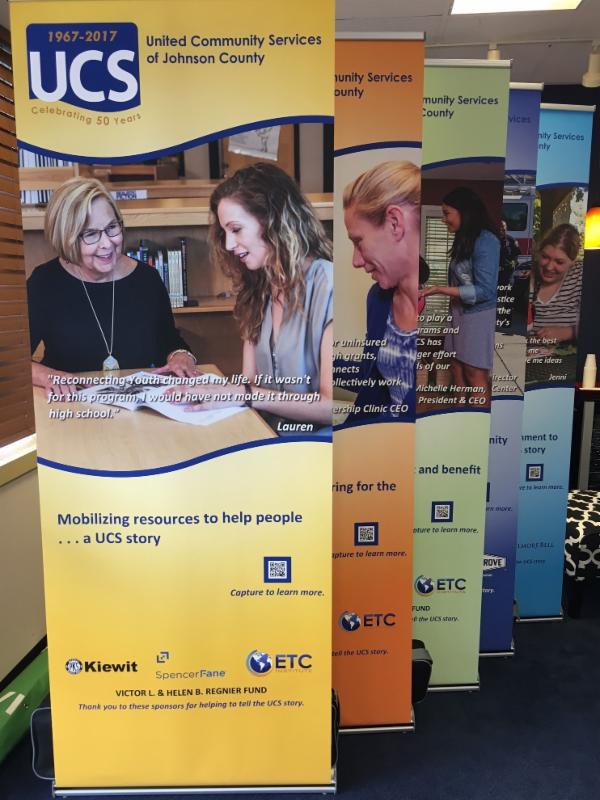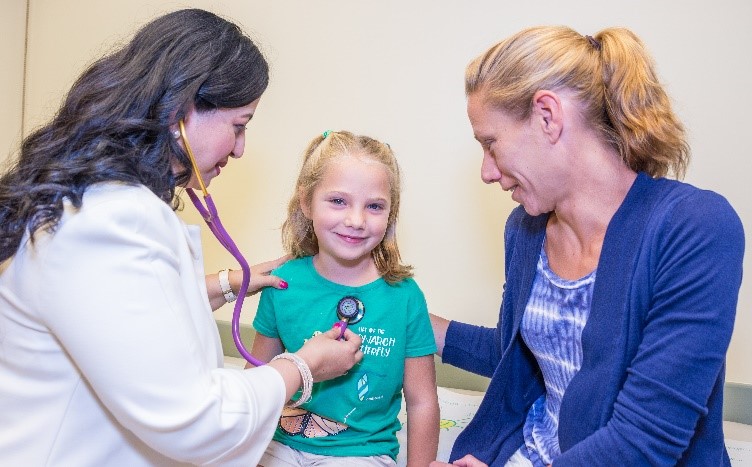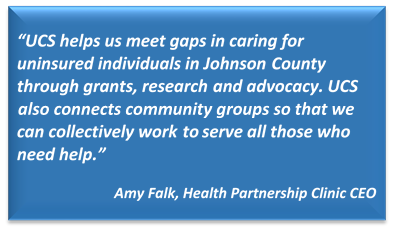|
Celebrating 50 Years of UCS Through the Stories We Help Create
|

UCS has always been an organization whose story is best told through the impact of its work. The organization's 50th Anniversary Committee, led by board volunteer Donna Lauffer, has embraced this approach and is celebrating UCS' milestone by telling the stories the organization has helped make possible through its work, community partnerships and collaborations.
Below is the first of a series of stories that will be featured in our eNewsletter, Facebook, and website. Additionally, you may encounter one of our story banners that will be on display throughout the community over the next few months. These are our stories, your stories, the community's stories. If you have a UCS story you would like to share, please send it to Julie Brewer at julieb@ucsjoco.org . Thank you for being a part of our story for 50 years.
|

Health Partnership Clinic & UCS:
Addressing the gaps in caring for the uninsured
In the early 1990s, United Community Services of Johnson County was a catalyst to what was to become the first and only Federally Qualified Health Clinic (FQHC) in Johnson County. County commissioners tasked UCS with convening a community committee, the Health Care Access Planning Task Force, on its behalf to identify and implement solutions. This work resulted in Health Partnership Clinic of Johnson County opening its doors in 1992. Today, the Health Partnership Clinic is one of the largest safety net clinics in Kansas, providing high-quality, affordable, accessible and culturally appropriate care to all individuals regardless of their ability to pay.
|
|
The Need
The number of Johnson County residents without healthcare was a growing problem in the early 1990s. A significant number were not receiving insurance from their employers and could not afford it on their own. Despite Johnson County's robust economy, people were falling through the cracks.
Families were forced to make tough decisions - pay for health insurance or pay the rent. At the time, Medicaid was mainly for children, so adults needing care often waited until they were so sick that a trip to the Emergency Room was imminent. Mandated by law to provide care, hospitals passed the cost on to taxpayers.
"It's really the same problem we have today - people couldn't afford insurance," said Jeff Ellis, a founding board member and two-time president of the Partnership board of directors and past board president of UCS. "The adult indigent load at hospitals was growing and costing all of us money. We said, 'Let's try to get some primary care to keep people healthier and get them care when they need it.'"
|

The Result
UCS formed the Health Care Access Planning Task Force in 1990-1991. Backed by UCS-conducted research, the goal of the task force was to identify and implement a local public-private strategy for improving access to primary healthcare for medically indigent residents. The clinic emerged from that work.
The Health Partnership Clinic tapped volunteer healthcare providers who provided care on a free basis. Recognizing the need firsthand, Ellis said doctors jumped in and helped out right from the start. If people could pay, they'd let them but those who couldn't were never charged.
Lasting Impact
Today the Health Partnership Clinic is a FQHC, which has grown from its flagship location in Olathe to include satellite clinics in Shawnee Mission, Ottawa and Paola. Children can now be treated at the clinic and all patients are welcome including the uninsured. FQHC status allows patients receiving Medicaid and Medicare benefits to pay for services using a sliding fee scale system, which is also extended to other patients.
No longer entirely staffed by volunteer providers, patients receive care from a staff of full- and part-time providers including doctors, dentists, nurses, behavioral health consultants and others. Seeing the same professional at each visit is extremely important in managing chronic diseases. Support from area hospitals is also critical to the care model, according to Health Partnership Clinic Chief Executive Officer Amy Falk.
UCS continues to play a vital role for the Health Partnership Clinic. UCS helps the clinic meet gaps in caring for uninsured individuals through grants from the Human Service Fund it manages. In addition, the clinic relies on UCS research to determine unmet needs - now and in the future. UCS advocacy helps inform decision-makers on needs. And just as it did in the beginning, UCS acts as a convener of community groups to provide a forum for collaboration such as the Homeless Continuum of Care and the annual Human Service Summit.
|
|
Thank you to our Visionary, Storyteller and Bard level sponsors for helping to tell the UCS story.
|
 |
|
|
|
Make A Donation: Giving to honor our past and prepare for our future is a great way to help us celebrate 50 years and those who have served our community through UCS. We are happy to offer this easy online giving option.
|
|
|
|
Our mission: Provide data analysis, lead collaborative planning and mobilize resources to enhance the availability and delivery of health and human services.
Contact us at 913-438-4764 or www.ucsjoco.org
|

